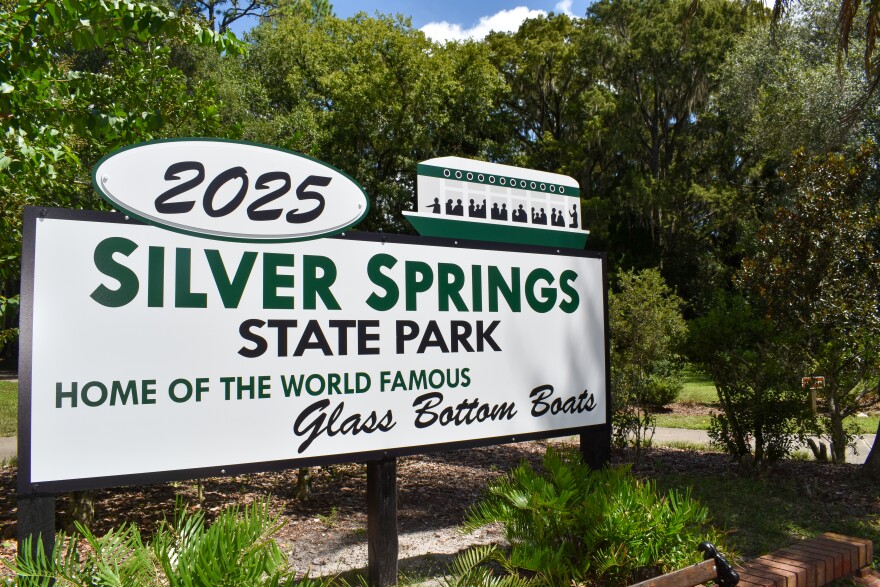A push in Congress to designate Ocala National Forest and the surrounding springs is drawing mixed feedback from locals, economists and conservationists.
Rep. Randy Fine, R-Fla., has proposed the bill Path to Florida Springs National Park Act, or H.R. 4656, directing the secretary of the interior to conduct a special resource study to evaluate the “suitability and feasibility of establishing a Florida Springs National Park in Central and North Florida.”
The bill covers land approximately 2,800 square miles, including south of Jacksonville, north of Orlando and east of Gainesville. The bill would include Ocala National Forest, Silver Springs Forest Conservation Area, Paynes Prairie Preserve State Park, the Ocklawaha River and other preservation areas.
Fine said the inspiration for the bill came from his own travels and his appreciation of national parks around the country and Florida’s many springs. He has visited nearly every national park and decided to take his children along after they were born. He found Florida’s springs just as remarkable as any national park he had seen.
“In the same way that Yellowstone became a national park because it’s the largest concentration of geysers in the world, Florida has the largest concentration of natural springs in the world,” he said. “So, the idea of the bill is that Florida springs deserve national recognition.”
Fine also pointed to two main reasons for the bill: protecting Florida’s springs, which he said are under threat, and drawing more tourism to central and north Florida.

Tourism would boom, according to Megan Lawson, an economist at Headwaters Economics, a nonprofit research group that analyzes the economic impact of public land use. National park designation gives public lands a visitation boost, as many travelers try to check every national park off their lists.
“It’s like instant branding and marketing for these places,” Lawson said.
While it’s difficult to predict the economic benefit of national park designation now, Lawson added that the National Park Service annually measures the economic impact of all park units around the country.
Surrounding communities will also have to adapt to increased visitation. Lawson said the key is anticipating visitor numbers and finding ways to fund upgrades, like roads or water treatment, so costs don’t fall solely on residents.
Some local residents and conservation groups have different sentiments about national park designation, questioning whether redesignating the area would bring meaningful benefits.
Ryan Smart, executive director of the Florida Springs Council, said he believes Fine is sincere in his desire to help Florida’s springs but sees the bill differently: “If it ain’t broke, don’t fix it.”
He said the Florida Department of Environmental Protection and Florida Forest Service set a high standard in managing the state’s public lands, a job few other state governments do as well. Their management has earned Florida’s state parks four gold medals, the most of any state, and a spot as a finalist for the fifth.
“At a time when our national park system is under attack by politicians in Washington, D.C., Florida’s state parks have unified support from our representatives in Tallahassee,” Smart said in a statement.
Smart added that national park designation could bring about a host of other issues and could jeopardize recreational opportunities like off-roading, hiking, camping, fishing and hunting.
“We need to prohibit and regulate pollution and harmful water withdrawals, not outdoor recreation,” he said.

Residents also currently have a say in how state lands are managed, including through participation in drafting management plans. Moving decision-making to the federal level could reduce their ability to protect and manage those lands.
Bobbie Jo Dameron, an Ocala resident who shares a property line with Ocala National Forest, said the fight against the bill is personal.
In a Change.org petition started by Dameron opposing the bill, she details her stance against tourism, environmental damage, strained infrastructure and loss of cultural identity. The petition has received over 6,000 signatures.
“What we don’t need is the federal government coming in with a national park label that pushes out the very people who’ve lived, worked and raised families here for generations,” she said.
Other Floridians, identified by first name only, also expressed similar concerns in the petition’s comment section about tourism and environmental impacts.
Fine added that opposition may stem from misunderstandings about the bill. He acknowledged that some opposition would be likely if the bill established park boundaries and regulations. However, the bill only directs a study to determine if a national park is possible.
“The only people who should oppose this bill are people who don’t think Florida springs are worthy of protection and a national designation,” Fine said. “If you agree with those two things, you’ll support the bill.”

